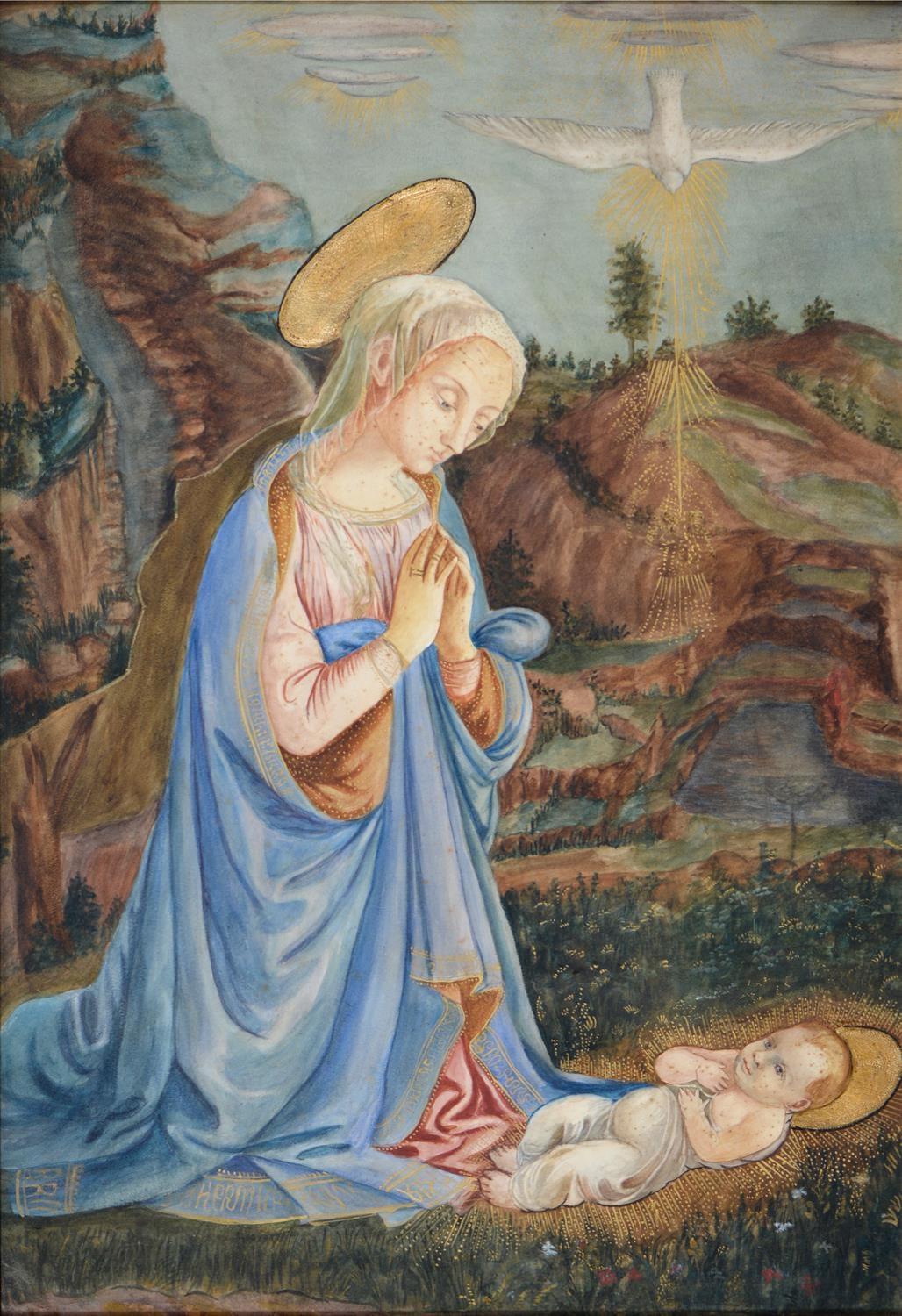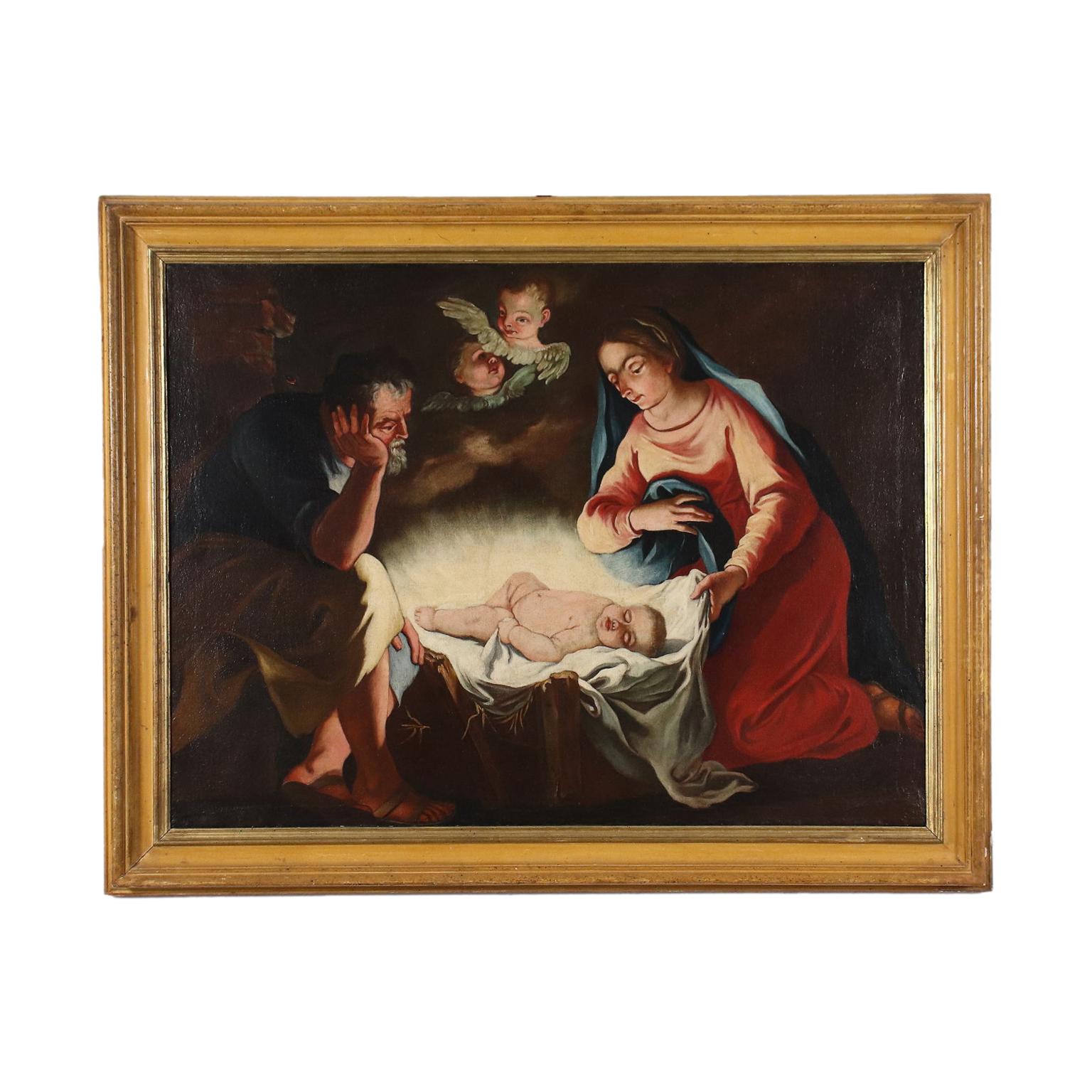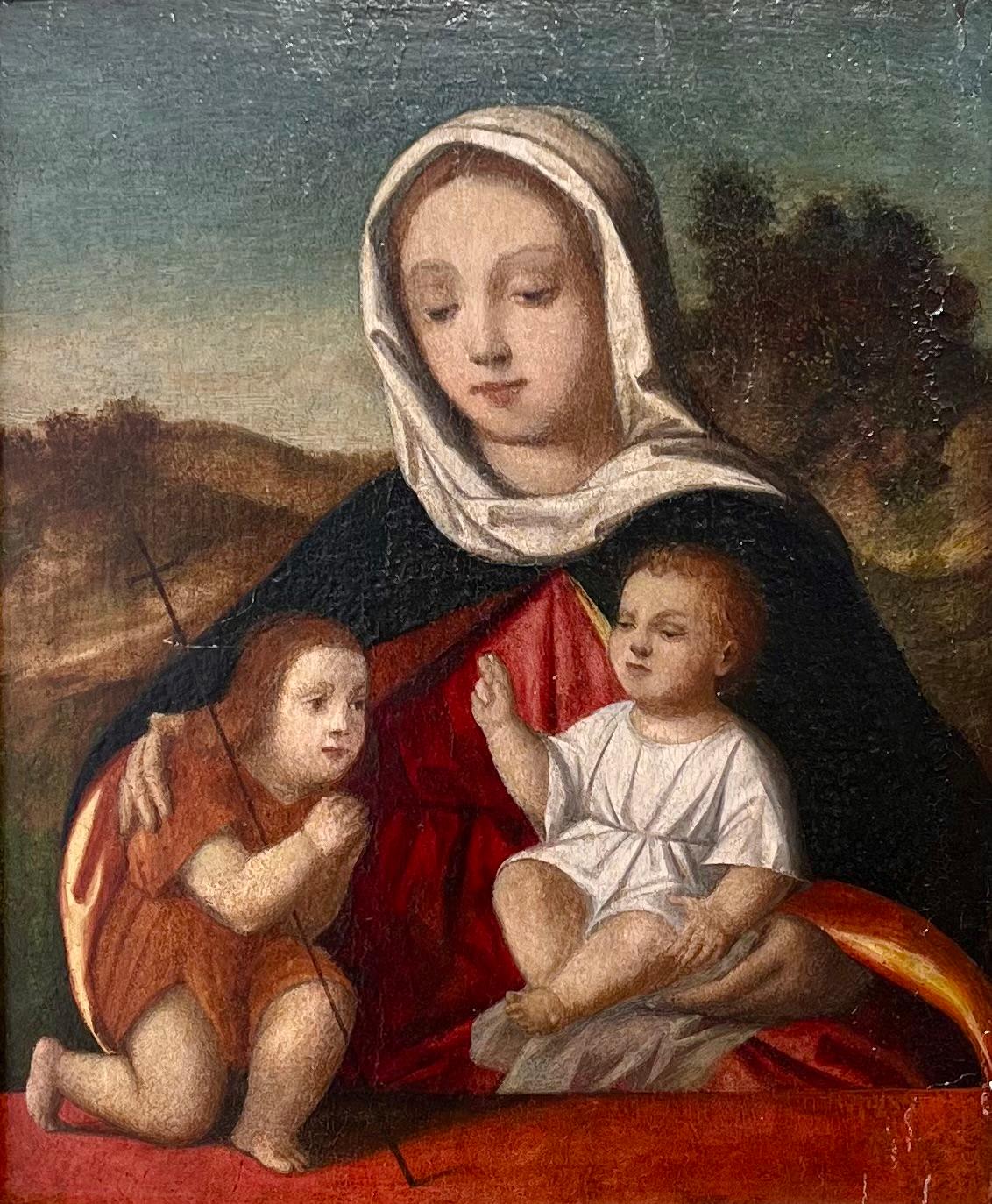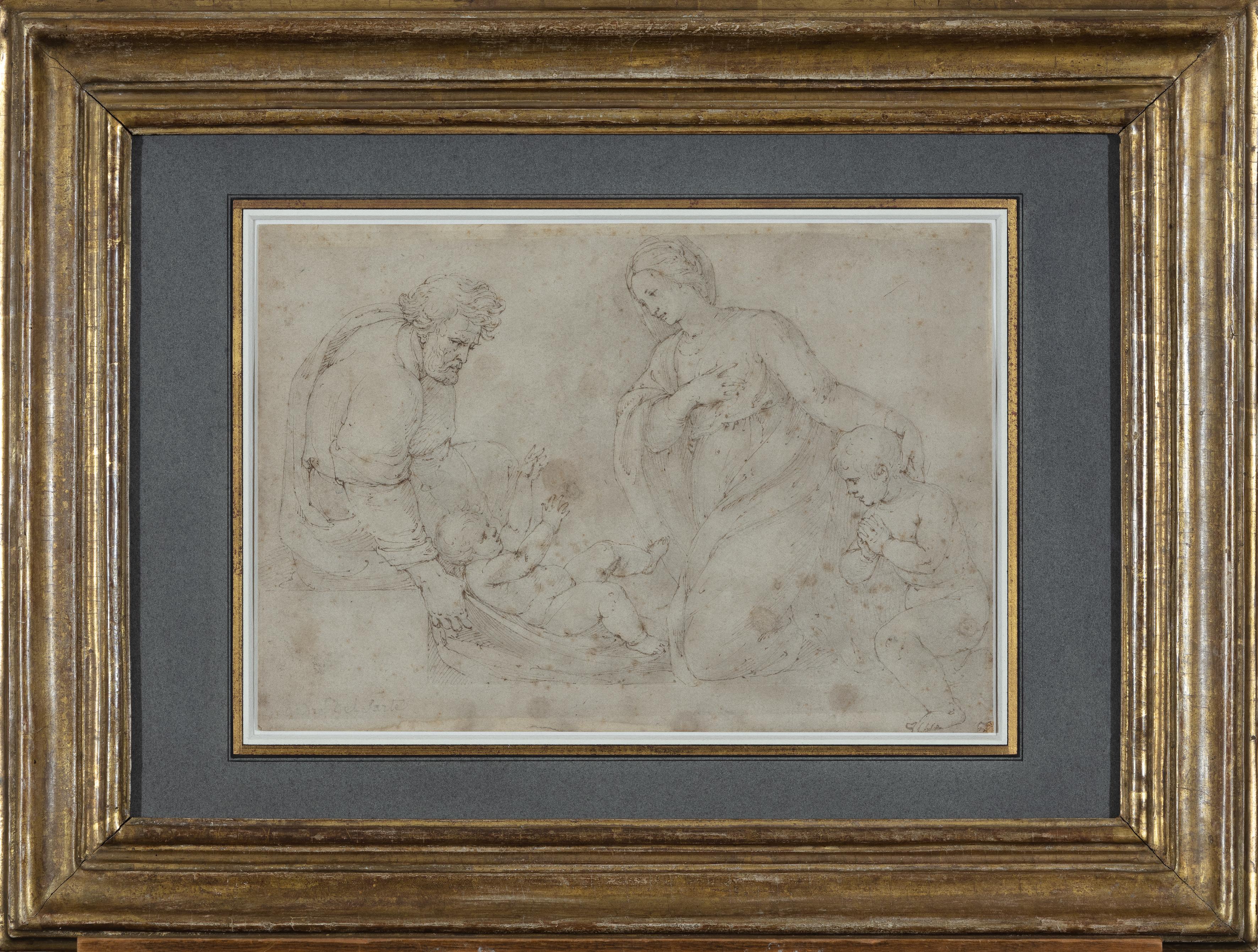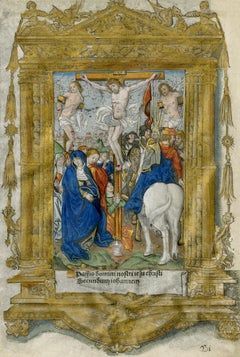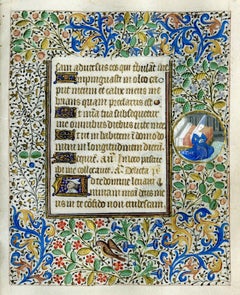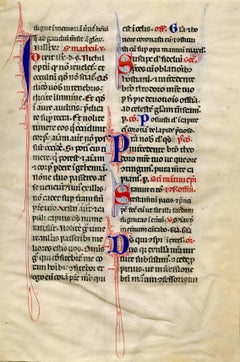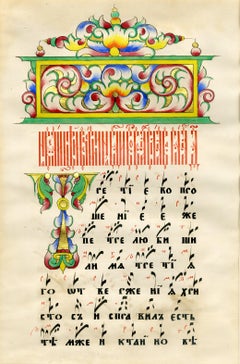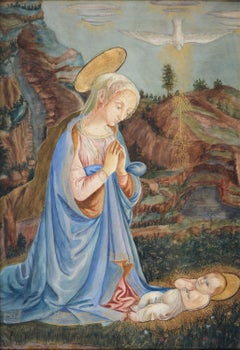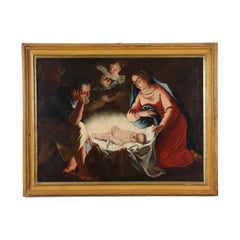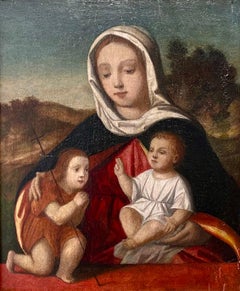Items Similar to The Nativity of Christ
Want more images or videos?
Request additional images or videos from the seller
1 of 8
Anonymous 15th ArtistThe Nativity of Christc. 1480
c. 1480
$4,000
£3,030.76
€3,477.56
CA$5,628.65
A$6,187.43
CHF 3,251.83
MX$75,137.94
NOK 40,565.75
SEK 38,433.20
DKK 25,953.88
About the Item
Anonymous 15th Century Italian, Probably Milan area
The Nativity of Christ
Pigments, ink and gold leaf on vellum
Unsigned as is always the case with illuminated manuscripts
The Virgin kneels in adoration as the child lies on the grass in a ruined building with the ox and ass peering over the wall, large historiated initial “L” in colored leafy design on burnished gold ground, probably introducing the Introit “Lux fulgebit” for the dawn Mass on Christmas Day.
Text is a rounded Gothic hand and musical annotation is four stave.
Condition: Excellent colors
Trimmed
The vellum folio with usual waviness
Image size: 6 3/4 x 5 1/4 inches (The gold leaf and painting)
Vellum fragmanet size: 11 1/8 x 9 3/4 nches (including calligraphy)
Housed in a raw silk matting which measures 18 x 16 1/4 inches
One of the high points for Christians in the religious calendar. The celebration of Christmas!!!!!!
- Creator:Anonymous 15th Artist (1400 - 1500, Italian)
- Creation Year:c. 1480
- Dimensions:Height: 11.25 in (28.58 cm)Width: 9.75 in (24.77 cm)
- Medium:
- Movement & Style:
- Period:
- Condition:
- Gallery Location:Fairlawn, OH
- Reference Number:Seller: FA109861stDibs: LU14015317742
About the Seller
5.0
Recognized Seller
These prestigious sellers are industry leaders and represent the highest echelon for item quality and design.
Platinum Seller
Premium sellers with a 4.7+ rating and 24-hour response times
Established in 1978
1stDibs seller since 2013
813 sales on 1stDibs
Typical response time: <1 hour
Associations
International Fine Print Dealers Association
- ShippingRetrieving quote...Shipping from: Fairlawn, OH
- Return Policy
Authenticity Guarantee
In the unlikely event there’s an issue with an item’s authenticity, contact us within 1 year for a full refund. DetailsMoney-Back Guarantee
If your item is not as described, is damaged in transit, or does not arrive, contact us within 7 days for a full refund. Details24-Hour Cancellation
You have a 24-hour grace period in which to reconsider your purchase, with no questions asked.Vetted Professional Sellers
Our world-class sellers must adhere to strict standards for service and quality, maintaining the integrity of our listings.Price-Match Guarantee
If you find that a seller listed the same item for a lower price elsewhere, we’ll match it.Trusted Global Delivery
Our best-in-class carrier network provides specialized shipping options worldwide, including custom delivery.More From This Seller
View AllCrucifixion
Located in Fairlawn, OH
Jean Pichore workshop, 1500-1541
Crucifixion
Metal cut engraving printed on vellum with vintage hand coloring
c. 1500-1541
Miniature (image) size: 4 3/4 x 3 1/8"
Including decorated ...
Category
16th Century Old Masters Figurative Prints
Materials
Engraving
Roundel depicting St. Catherine
Located in Fairlawn, OH
Unknown French Art and Workshop, Middle 15th century
Roundel depicting St. Catherine (?)
Gouache, ink gold wash and gold burnishing on vellum
Book of Hours folio attributed to the C...
Category
15th Century and Earlier Old Masters Figurative Paintings
Materials
Gouache, Pigment
Folio from Communion of Saints, Reading from the Book of St. Matthew.
Located in Fairlawn, OH
Readings from the "Communion of Saints": folio from an Italian Missal
Pigment on vellum
Mid 17th century
Provenance:
Otto F. Ege (1888-1951)
Phillip Duechnes Bookseller, New York, c. 1948
References And Exhibitions:
Otto F. Ege Box Folio 27
Ege describes these folios as: Epistolary (Epistolarium), Italy, Middle 15th century
Latin Text: Rotunda or Round Gothic Script, square rhetorical neumes
Sister folio are in the following rare book libraries:
Case Western Reserve University
Cincinnati Public Library
Cleveland Institute of Art
Cleveland Public Library
Denison University
Kent State University
Kenyon College...
Category
15th Century and Earlier Old Masters Abstract Drawings and Watercolors
Materials
Ink, Vellum
Russian Orthodox Church, Middle 19th Century
Located in Fairlawn, OH
Unknown Russian Artist
Russian Orthodox Church, Middle 19th century
Unsigned
Illuminated in red, yellow blue and green pigments and gold leaf on paper
...
Category
Mid-19th Century Old Masters Abstract Paintings
Materials
Pigment
Russian Orthodox Church, Middle 19th Century
Located in Fairlawn, OH
Unknown Russian Artist
Russian Orthodox Church, Middle 19th century
Unsigned
Illuminated in red, yellow blue and green pigments and gold leaf on paper
An Illuminated manuscript folio...
Category
Mid-19th Century Old Masters Abstract Paintings
Materials
Pigment
The Death of Lazarus
By Hieronymus Wierix
Located in Fairlawn, OH
The Death of Lazarus
Engraving, 1593
Feria VI. Post Domin IIII
From: Evangelicae Historiae Imagines, Plate 76
Condition: Excellent
Sheet size: 9 7/8 x 6 1/8 inches
Reference: Referen...
Category
16th Century Old Masters Figurative Prints
Materials
Engraving
You May Also Like
The Adoration Of The Christ Child Fine Renaissance Old Master Painting Large
Located in Cirencester, Gloucestershire
Artist/School: After Filippo Lippi, Italian 1406-1469. The work is most likely by an English hand, late 19th century
Title: The Adoration of the Christ ...
Category
19th Century Renaissance Figurative Paintings
Materials
Watercolor
Adoration of the Child Jesus, XVII century
Located in Milan, IT
Oil painting on canvas. Northern Italy school. The depiction of the Nativity is seen here as a contemplative moment of the Holy Child, by Mary and Joseph, accompanied by little angel...
Category
17th Century Other Art Style Figurative Paintings
Materials
Oil
Adoration of the Shepherds
By Peter Paul Rubens
Located in New York, NY
Adoration of the Shepherds after Peter Paul Rubens (Flemish, 1577-1640), engraved by Pierre-Franois Basan (French, 1723-1797), engraving, c. 1750, in black on ivory laid paper, 282 x 200 mm., with small margins. In very good condition.
A fine proof impression, before letters. A draft printing of letters is visible, lower left, below image: “P P Rubens inv.”; lower right: “F. Basan excudit”.
Basan’s engraving after Rubens may be modeled after another engraving of the Adoration after Rubens by Theodor Galle (1571-1633), which appeared as an illustration to the 1618 reprint of 1616 edition of “Missale Romanum...
Category
1750s Old Masters Figurative Prints
Materials
Engraving
Madonna with Holy Child and St. John
Located in Fredericksburg, VA
Madonna with Holy Child and St. John is a masterful depiction of a tender religious scene, capturing the sacred relationship between the Virgin Mary, the infant Jesus, and St. John t...
Category
17th Century Old Masters Portrait Paintings
Materials
Wood, Oil
Painting Nativity of Jesus 18th century
Located in Milan, IT
Oil on oak panel. Flemish school of the XVII-XVIII century.
The sacred depiction proposes the moment of Jesus' birth in a cave, watched over and worshipped by Mary and Joseph togeth...
Category
18th Century Other Art Style Figurative Paintings
Materials
Oil
The Holy Family with the Infant Saint John the Baptist
By Raphael (Raffaello Sanzio da Urbino)
Located in Paris, Île-de-France
STUDIO OF RAFFAELLO SANZIO, called RAPHAEL
(Urbino 1483 – Rome 1520)
Title The Holy Family with the Infant Saint John the Baptist
Medium Pen and brown ink, brown wash, over black ch...
Category
16th Century Old Masters Figurative Drawings and Watercolors
Materials
Ink
More Ways To Browse
15th Century Italian
Antique Illuminated Manuscript
Antique Nativities
Nativity Painting
Italian Nativity
Antique Italian Nativity
Sisters Impressionist Painting
St Sebastian
Victorian Family Painting
Vintage Little Girl Painting
Vintage Sports Paintings
17th Century Memento Mori Paintings
18th Century Oil Tavern Paintings
Architecture Bas Relief
Ballet Dancer Oil Painting
Bathing Suit Art
Cello Painting
Cowboy Hat Art
